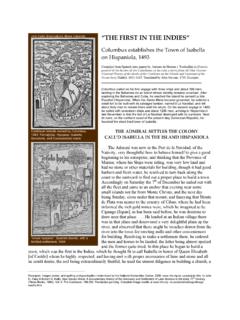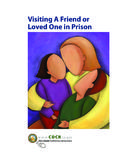Transcription of Chapter 2: The Thirteen Colonies and the British Empire ...
1 Chapter 2: The Thirteen Colonies and the British Empire , 1607-1750. 1. Introduction a. 13 Colonies formed, each with a document granting special privileges from the English monarch (charter). i. corporate Colonies - Jamestown- operated by joint-stock companies ii. royal Colonies - Virginia after 1624- under direct authority and rule of king iii. proprietary Colonies - Maryland and Pennsylvania- under authority of individuals with royal charters b. Unlike French and Spanish, English colonists had tradition of independence and representative government 2.
2 Chesapeake Colonies a. The Founding of Jamestown i. King James I grants charter to London Company in 1604. ii. Colonists land in Jamestown, Virginia in 1607. iii. economically motivated, not religiously motivated iv. Early problems 1. location- outbreaks of dysentery and malaria 2. diet- physically even more susceptible to disease 3. looked for nonexistent gold, wasted their resources v. John Smith imposed work and order on community 1. also organized raids on Indians to steal food and kidnap natives b. Reorganization i. London Company became Virginia Company 1609, gained expanded charter, sold stock, wish to grew VA colony with land grants to planters ii.
3 Ships with new colonists didn't make it to Jamestown iii. Winter of 1609-1610= starving time 1. local Indians retaliated against Jamestown, killed livestock and barricaded them iv. First governor Lord De La Warr arrived 1609, established harsh discipline w/ work gangs, communal v. Communal system didn't work well, so private ownership and cultivation of land again c. Tobacco i. John Rolfe started to grow tobacco in Virginia, bringing financial prosperity to the colony ii. initially, labor force was indentured servants, but expanded to blacks as well iii.
4 Created need for territorial expansion, caused conflict with Natives d. Expansion i. Tobacco not enough to make profits, 1618 campaign to attract settlers ii. Headright system- land grants to new settlers, encouraged family groups to migrate together, rewarded those who paid for passages of others iii. Company brought women and skilled workers iv. colonists had the full rights of Englishmen v. allowed for a share in self-govt (VA House of Burgesses met July 30, 1619). vi. 1919 saw arrival of first Negro slaves on Dutch ship, but planters continued to favor indentured servants until at least 1670s b/c cheaper and more abundant vii.
5 Colony able to grow b/c Indians suppressed viii. Sir Thomas Dale led assaults on the Indians ix. huge uprising staged by Powhatans in 1622, very successful, but eventually put down in 1644. x. 1624- because of debt, Virginia Company lost all funds and charter for the colony and became England's first royal colony e. Virginia was split between Virginia and Maryland f. Maryland was given to George Calvert (Lord Baltimore). g. Maryland i. proprietorships were established instead of corporate charters so the king could have more control ii. Cecil Calvert attempted to finish his father's dream of both economic and religious prosperity for Catholics iii.
6 Act of Toleration- granted religious freedom to all Christians in Maryland, but ironically called for death of anyone who denied divinity of Jesus 1. passed in order to encourage Protestant settlement because many settlers were necessary to turn a profit 2. also passed to appease the Protestant majority iv. Protestant revolt- Protestants rebelled against Catholic proprietor after the Glorious Revolution so the Act of Toleration was repealed and Catholics lost their right to vote v. frequent violence between Catholics and Protestants, which precipitated civil war in 1655.
7 Vi. like Virginia, Maryland adopted headright system and became center of tobacco cultivation h. Virginia i. Economic problems- when Virginia attempted to raise the low tobacco prices due to overproduction of tobacco, the merchants of London raised the prices of goods from Vienna ii. Bacon's Rebellion 1. background a. Sir William Berkeley (governor) caused resentment among the backwoods farmers by failing to protect their settlements from Indian attacks when he agreed to respect a settlement line with the Indians b. only landowners had the right to vote and elections were rare, so recent settlers in backcountry were underrepresented 2.
8 Motive: a. wanted harsher policies towards natives b/c backcountry folk were in constant danger from Indians b/c of their proximity to them b. also believed that the government (rich East Virginian whites) didn't want to protect the backcountry folk b/c they wanted to maintain their dominance i. probably true, but Berkeley also respected the Indians b/c he wanted to protect his lucrative fur trade 3. event a. led unauthorized raid against Indians which turned into a military challenge to the colonial government b. Bacon nearly took over the government, but died of dysentery 4.
9 Long term significance a. poor white, landless people were unstable b. colonial resistance to royal control c. settlers unwilling to abide by agreements with natives and natives unwilling to tolerate further encroachment upon their territory d. eastern and western aristocracy turned to black slaves for labor, rather than the poor people b/c they wanted to prevent social unrest iii. Labor Shortages 1. high death rate due to disease and Indian attacks 2. imbalance between the number of men and women 3. indentured servants- people agree to be slaves for a while, then are supposed to get freedom/money/land a.
10 Females could marry easily b/c of the gender imbalance b. some were involuntary convicts or victims of kidnapping c. very fluid people who moved whenever they saw opportunity-- source of social unrest d. 1670s/1700- became less popular b/c England became a better place to live 4. headright system- offering land to people who paid their own passage or anyone who paid for someone else's passage 5. slavery- began in 1619, initially had the same status as white indentured servants, but in the 1660s, House of Burgesses started laws (slave codes) that discriminated between blacks and whites a.





